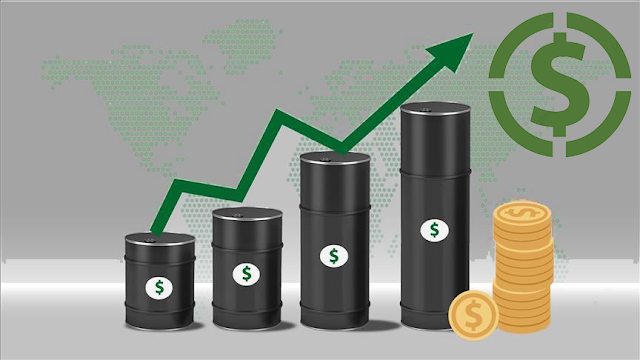Oil prices rose on Tuesday and investors moved more money out of stocks into ultra-safe US government bonds as Russia escalated its war against Ukraine.
- Stocks fell as investors tried to gauge the conflict's impact on the global economy. The S&P 500 was down 1.6% at 12:04 p.m. m., eastern time. The Dow Jones Industrial Average fell 687 points, or 2%, to 33,204 points, and the Nasdaq fell 1.5%.
- The biggest moves came from the oil, farm and government bond markets. Oil was a big concern because Russia is one of the world's largest energy producers. The recent increase in prices has added to the pressure on the ever-higher inflation that threatens households around the world.
- Benchmark U.S. crude oil prices rose 10.6% to $105.82 a barrel, hitting the highest price since 2014. Brent crude, the international benchmark, rose 9% to $106.82.
- The crisis in Ukraine provoked an extraordinary meeting of the Board of Directors of the International Energy Agency, which resulted in the agreement of the 31 member states to release 60 million barrels of oil from its strategic reserves,
- The Russian invasion of Ukraine has also put more pressure on agricultural commodity prices, which have already soared with rising inflation. Wheat and corn prices are up more than 4% per bushel and are already up more than 20% year to date. Ukraine is a major exporter of both crops.
- Investors continued to put money into bonds. The 10-year Treasury yield fell sharply to 1.71% from 1.83% on Monday night. Now it's back to where it was in January. In February, it had crossed 2% for the first time in more than two years. The 10-year Treasury yield is used to determine interest rates on mortgages and many other types of loans.
- The conflict in Ukraine has rattled markets globally and raised concerns about economic growth in the face of rising inflation and plans by central banks to raise interest rates. The United States and its allies have put significant pressure on Russia's financial system as that country continues its rush toward Ukraine and its major cities.
- The value of the Russian ruble fell to a record low on Monday after Western countries moved to block some Russian banks from the main global payment system. On Monday, the US Treasury also announced new sanctions against the Central Bank of Russia.
- Several companies have announced plans to downsize or withdraw from projects in Russia, or to suspend operations in Ukraine due to the conflict. Russia's central bank also raised its key interest rate to 20% from 9.5% in a desperate bid to prop up the falling ruble and avoid a fight over banks. The Russian stock market remained closed on Tuesday.
- Investors are closely following developments in Ukraine as they await the latest updates from the Federal Reserve and the US government on the economy. Federal Reserve Chairman Jerome Powell is due to testify before Congress later this week and that could provide clues as to the future path to raise interest rates. Friday's report will also show whether the strength of the US labor market persisted in February, allowing the Federal Reserve more leeway to raise interest rates.
- Several stocks have made big moves in earnings. Target jumped 10.6% after reporting strong financial results for the fourth quarter and said it would spend up to $5 billion this year on brick-and-mortar stores, remodels and other initiatives. The trading day rose 6% after reporting encouraging gains.


Comments
Post a Comment